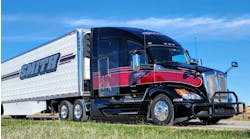Probably no one admits fear of the mail. Refusing to admit the anxiety doesn't make handling mail any easier these days and probably slows down some mail-dependent systems such as bill processing at truckload carriers. Unless a job is dedicated to mail handling, most workers can always find something else to do for a while to put off the task of slitting open envelopes.
In fact, since the anthrax scare following September 11, several trucking companies have had mailrooms or adjacent buildings shut down while emergency response teams inspected suspicious packages and conducted analysis. The best defense against these incidents is to eliminate as much paper in the workplace as possible. A second line of defense is keeping essential paperwork out of the US mail where it could be accidentally contaminated and moving it through a proprietary handling system.
Outsourcing, particularly through TMI services such as TripPak ONLINE and TripPak EXPRESS, offers central document handling and processing. TripPak EXPRESS offers proprietary document handling by providing more than 1,000 drop boxes at truckstops, public warehouses, and other receivers for drivers to ship their delivery receipts and other paperwork to a central location for processing and forwarding to motor carriers. TripPak ONLINE takes the service a step farther by imaging documents and making them available online within 18 hours of load delivery.
Refrigerated carriers have long used document-imaging systems to speed internal operations. Placing archive quality images in a company's information management system allows an unlimited number of office workers to handle a document at the same time without requiring access to the physical document. These systems also allow carriers to produce documents at customer request without having to locate the original and make a copy for mailing or faxing. The electronic image can be transmitted immediately as a fax.
The next step for large, progressive carriers such as Marten Transport and C R England has been to move the document handling and imaging process offsite. Carriers such as these have contracted for TripPak ONLINE service. This is an extension of the TripPak EXPRESS service, which is designed to expedite trip paperwork processing. With TripPak EXPRESS, physical documents are available overnight following driver drop-off.
TripPak ONLINE takes on the task of processing documents and matching them to a carrier's daily dispatch records. Nothing changes for the driver; documents are deposited in TMI's proprietary drop boxes for courier delivery just as with TripPak EXPRESS. However, instead of delivery to the motor carrier, documents are delivered to a TMI facility in Wilmington, Ohio, where they are imaged and made available to the carrier online. Carriers have Internet access to documents as early as 2:30 am on the morning following a delivery.
When document imaging began, only large carriers could afford the expense of hardware and software to support the systems. That all has changed. Now fleets with as few as 15 trucks can make use of outsourced document handling. Users can choose to receive the physical documents after imaging, or they can have the service provider archive the physical material. Handling is secure with a verifiable chain of custody for each document. Offsite archiving and backup digital storage is beginning to attract users following the example of business disruption that occurred September 11.
Not all mail handling need be so high-tech that workers see mail only on a computer screen. Kevin M Foley, president of TMI, suggests a number of common sense approaches to the mail to allay worker fears. He recommends devoting time to the subject in senior staff meetings and meeting with workers to solicit ideas and air concerns. He says that employers should provide free latex gloves to employees who want them; at the same time he says that simple paper facemasks offer little protection. Workers should wash their hands carefully with soap and hot water after handling mail, and mail opening equipment should be sanitized daily with bleach. He also recommends contacting local emergency response teams to learn how to react to suspicious packages and letters.
In addition to these recommendations, TMI will host an online conference titled “Homeland Security in the Mail Room.” It will be presented free as a service to trucking company executives at 11 am CST on December 11, 2001. To participate, call Jana Cutlip at (800) 298-7202 extension 1320 for reservations. To learn more about TMI services, visit www.trippakonline.com.


